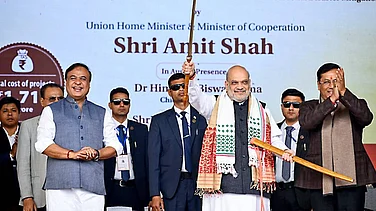Kerala government on Tuesday voted to pass an ordinance to remove Governor Arif Mohammad Khan as the Chancellor of the universities.
The official release from the Chief Minister’s Office says that the cabinet will ask the Governor to promulgate an ordinance that will seek to bring an expert as the Chancellor of 14 Kerala universities.
The statement reads, "The Ordinance is meant to amend the University Rules pertaining to the post of Chancellor of the Universities in the state. The draft of the ordinance would remove the particular section from the University Rules, which has made the governor the ex-officio chancellor of the 14 universities in Kerala."
Dr. R Bindu, the Kerala higher education minister while addressing the media said they hope that the Governor will sign the ordinance. "The governor has the constitutional obligation to sign the ordinance. We hope he will fulfil that obligation. Due to the recent developments in the universities, the state’s higher education sector is in crisis. We cannot allow things to go like this. The government has given top priority to enhancing the standards in the higher education sector," she added.
Can a Governor be removed as a Chancellor?
The Left government in Kerala is upholding that the Constitution does not envisage the role of Chancellorship for the Governor while stating that the role of ex-officio Chancellor of State Universities was entrusted by the State Legislative Assembly.
In most cases, the Governor of the state is the ex-officio chancellor of the universities in that state. While as Governor he functions with the aid and advice of the Council of Ministers, as Chancellor he acts independently of the Council of Ministers and takes his own decisions on all University matters
Although there are reportedly no Constitutional regulations that legally bind a Governor to remain the Chancellor, the Punchhi Commission of 2010 recommended that there should be a provision for the impeachment of the governor by the state legislature. The state chief minister should have a say in the governor’s appointment.
Following the continuous war of words between CM Pinarayi Vijayan and Khan, the Law Department has recalled the recommendations of the Punchhi Commission that states that the Governor should not be “burdened with positions and powers, which may expose the office to controversies or public criticism”.
The Kerala government is also closely looking at the recent Bill passed by the West Bengal government in June to make the Chief Minister Chancellor of State Universities.
Have there been previous instances?
On June 15, The West Bengal Assembly passed a bill to replace Governor Jagdeep Dhankar with Chief Minister Mamata Banerjee as the chancellor of a veterinary university.
According to the bill, the chancellor will appoint a distinguished academic as the vice-chancellor of the university out of a panel of three names recommended by a committee constituted by the state government.
The development came just days after the House passed The West Bengal University Laws (Amendment) Bill, 2022, to appoint the CM, in place of the governor, as the chancellor of all state-run universities.
It also said that the VC should hold office for a term of four years or till he attains the age of 70 years.
However, in July, West Bengal Governor Jagdeep Dhankar returned the Bill on the ground of “incompleteness of compliance”.
Similarly, following clashes of interests between the state governments and Governors, Tamil Nadu and Maharashtra, too, took steps to reduce the oversight of the Governors as Chancellor of Universities.
In April 2022, the Tamil Nadu Legislative Assembly passed two Bills, to transfer the power of appointing the Vice-Chancellor (in public universities) from the Governor, to the state government. As of June 8, 2022, these Bills have not received the Governor’s assent.
In 2021, the Uddhav Thackeray-led Maharashtra government amended the process to appoint the Vice Chancellor of state public universities. An amendment in the law on the appointment of vice-chancellors was approved at a cabinet meeting in December and as per the amendment, vice-chancellors would not be appointed directly by the governor and he can only approve the names recommended by the state government.
However, in September this year, the Eknath Shinde-led Maharashtra government decided to withdraw a bill moved by the erstwhile Maha Vikas Aghadi (MVA) administration that curtailed the powers of the Governor in the appointment of Vice-Chancellors in state universities. The decision to roll back the bill, that amended the Maharashtra Public Universities Act, 2016, was taken at a state cabinet meeting chaired by Chief Minister Eknath Shinde.
(with PTI inputs)


























